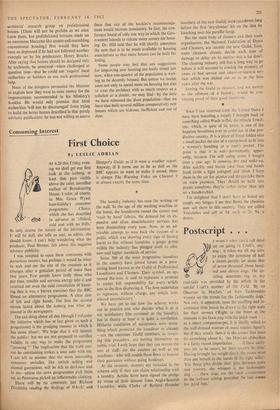Consuming Interest
First Choice
By LESLIE ADRIAN AT 6.20 this Friday even- ing we shall get our first look at the iceberg, at least that part visible above the calm, unruffled surface of Broadcasting House. I refer, of course, to Mrs. Grace Wynd- ham-Goldic's consumer programme Choice, which she has described €S'd in advance as 'clinical, cold and with no frills,' its only drama the nature of the information. I' will be dull, she tells us and, as editor, she should know. I can't help wondering what the producer, Paul Bonner. felt about this negative advance publicity.
I was tempted to open these comments with part urinal monies, but perhaps it would be wiser to wait and see the size of the creature as it emerges after a gestation period of more than two years. Few people know (only those who put time. trouble and nervous energy into it and received not even the cold consolation of know- ing that it was a barren exercise) that the BBC filmed an alternative programme. A clear case of left and right hands. The first the second eleven heard about the iceberg was what ap- peared in the newspapers.
The sad thing about all this (though I welcome the initiative which has at last given us such a programme) is the grudging manner in which it has come about: 'We hope that it will interest the public: but we are not prepareLl to sacrifice validity in any way to make the programme 'amusing."' The implication that the truth can- not be entertaining strikes a sour note with me.
am left to assume that the more interesting consumer swindles, like switch selling and slanted guarantees, will be left to darkness and to me—unless the news programmes pick them up, as Panorama picked up inflammable clothing.
There will be no comment; just Richard Dimbleby reading the findings of Which? and Shopper's Guide as if it were a weather report. Anyway, if it turns out to be as dull as the BBC appears to want to make it sound, there is always The Warning Voice on Channel 9 at almost exactly the same time.
The laundry industry has seen the writing on the wall. In the age of the washing machine in the home, the launderette round the corner and 'wash by hand' fabrics, the demand for its ex- pensive and often unsatisfactory services has been diminishing every year. Now, in an ad- mirable attempt to woo back the custom of a public which was showing every sign of having learnt to live without laundries, a ginger group within the industry has pledged itself to offer new and higher standards of service.
Sonic 300 of the most progressive laundries in the country have joined forces in a pace- setting band known as the Guild of Professional Launderers and Cleaners. Their symbol, an up- turned flat-iron, is said to represent a promise to accept full responsibility for every article sent to the firm displaying it. The firm,undertakes to reprocess, without charge, any article 'con- sidered unsatisfactory.'
We have yet to see how the scheme works out in practice and who decides what is or is not satisfactory (the customer or the laundry), but in theory at least it is quite a revolution. Hitherto conditions of, acceptance were some- thing which protected the launderer or cleaner —not the customer. Guild members, in revers- ing this procedure, are putting themselves on public trial. I only hope that they can recruit the sort of staff—for the counter as well as the machines--who will enable these firms to honour their guarantee without going bankrupt.
At the moment, cleaners are included in the scheme only if they can claim relationship with a laundry. Achille Serre have signed the pledge by virtue of their descent from Anglo-Scottish Laundries, while Clarks of Retford (founder members of the new Guild) were launderers long before the first `dry-cleaner' hit on the idea by knocking over his paraffin lamp.
But the main body of cleaners and their trade organisation, the National Federation of Dyers and Cleaners, are outside the new Guild. True, sonic cleaners already decide each case of damage or delay on its merits—but a lot don't. The cleaning industry still has a long way to go before it will succeed in erasing the memory of years of bad service and take-it-or-leave-it ser- vice which was dished out to us in the lean years after the war.
Joining the Guild as cleaners, and not merely as the oils-hoot of a laundry, would be con- vincing proof of their good intentions.
Since I last returned Irom the United States I have been hoarding a supply I brought back of something called Wash-'n-Dri, the miracle Towel- cue, which, in spite of its name, is one of the happiest inventions ever to come out of that pro- ductive country. It is a piece of tissue folded into a small packet the size of a stanip-book to lit into a woman's handbag or a man's pocket. The point is that it is wet—permanently, appar- ently, because I'm still using some I bought over a year ago. It removes dirt and make-up, dries quickly and leaves your face and hands fresh (with a light cologne) and clean. I keep them in the car for picnics and always take them on train journeys. They should be built into prams somehow; they're rather better than spit on a handkerchief.
I'm delighted that I don't have to hoard my supply any longer. I see that Boots the chemists now sell them in this country. They arc called Travelettes and sell at 3d. each or 2s. 9d. a dozen.

































 Previous page
Previous page